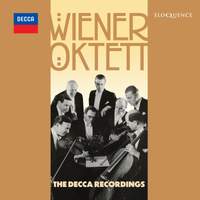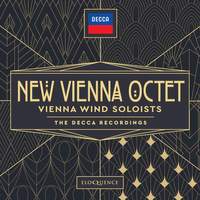Box Set Deep-Dive,
Vienna Octet Old and New

If you fancy a musical trip to Elysian fields you could hardly wish for better guides than the mellifluous-sounding ‘Vienna Octet’, launched post-War by the Boskovsky brothers (Willi, violin and Alfred, clarinet) - a designation that also encompasses the ‘New Vienna Octet’ and the ‘Vienna Wind Soloists’. All becomes clear when you peruse the ‘New Vienna Quartet’ collection pictured here where only the first four discs lay claim to the name ‘New’, most of the others reverting to the titles ‘Vienna Octet’ or the ‘Vienna Wind Soloists’. Of course there were wholesale personnel changes in the meantime, the sound of the ensemble(s) moving by stages from the gemütlich style of their first recordings (late 1940s/early 1950s) where many of the featured players are also familiar from Vienna Philharmonic concerts/recordings under Clemens Krauss, Wilhelm Furtwängler, Hans Knappertsbusch and others, to a more generalised beauty on a par with numerous world-class ensembles whose voices blend across the globe.
But this tends to be the way nowadays, so if you want the Octet as it sounded in the analogue era, still an echt-Viennese ensemble, then you’re likely to gravitate in the first place to what I shall henceforth call Box One (Wiener Oktett: The Decca Recordings). ‘Box Two’ (as I call it, ie New Vienna Octet; Vienna Wind Soloists: The Decca Recordings) gathers together later productions - and aside from maintaining high performing standards there’s the superb sound quality, often masterminded by producer Christopher Raeburn, the ‘ears’ behind the digital recordings, of which there are quite a few. Many were originally issued on Decca ‘Ace of Diamonds’ mid-price LPs.
Interestingly the 1989 recordings of the Mozart and Weber Clarinet Quintets and the 1992 recordings of Schubert’s Octet and Beethoven’s Septet (all are in Box Two) include among the players the members of the Vienna Quartet (who recorded the Schubert quartets for Camerata), which further cements a sense of musical camaraderie. Repertoire-wise, quite a few works crop up in both boxes. Schubert’s Octet is represented five times, in 1949, 1954 and 1958 (Box One) then in 1977 and 1992 (Box Two). Only the last recording offers us the first movement’s exposition repeat (likewise in the second of two versions of Mendelssohn’s Octet in Box One). Both boxes offer versions of Beethoven’s Septet, Brahms’s Clarinet Quintet and Mozart’s Clarinet Quintet. Schubert’s Trout Quintet is in the first Box, two recordings, the first, in mono, with pianist Walter Panhofer, the second, a famous early stereo taping with Sir Clifford Curzon, far subtler and more finely nuanced than its predecessor.

Relative rarities, as one might call them, crop up in both collections. Box One treats us to Rimsky-Korsakov’s delightful Piano Quintet, Berwald’s Grand Septet, two sun-drenched string quintets by Dvořák and a host of other works including Octets by Henk Badings and Egon Wellesz. The twentieth-century aspect of Box Two is given over to Françaix, Ibert, Janáček, Hindemith, Ligeti and Schoenberg, the latter’s Wind Quintet sounding like the ‘new normal’ in these players’ genial hands. Older Box Two novelties are by Taffanel, Cambini, Danzi, Reicha, Haydn Flute Trios and Mozart Flute Sonatas, and a musical evocation of a hunt through the Vienna Woods. So-called ‘classics’ proliferate in both sets, Mozart being the main player; his Serenade for 13 Wind Instruments (superbly performed, the famous ‘Amadeus’ Adagio a true benchmark) is a highlight of Box Two.
Transfer standards are high, as one might expect from this source, though there’s one anomaly that initially had me scratching my head. At 7:55 into the first movement of the 1948 Schubert Octet (Box One) you’ll encounter an extra chord, presumably from the end of an original 78 rpm side, where the same chord is repeated at the beginning of the next shellac side, so as to provide musical continuity - or discourage loss of concentration while changing sides. This was common practice back in the day and if taken literally Eloquence are being extra authentic and giving us the recording exactly as it was when first issued. No big deal - just be prepared for that extra chord.
Peter Quantrill provides perceptive annotations for both boxes. Buy both if you can, but if forced to decide I’d opt for the faultlessly engineered second Box first. Whichever you choose will bless your listening hours with countless joys. They really are special, reminding us of a fast-retreating bygone age.
New Vienna Octet, Vienna Wind Soloists
Available Format: 18 CDs




